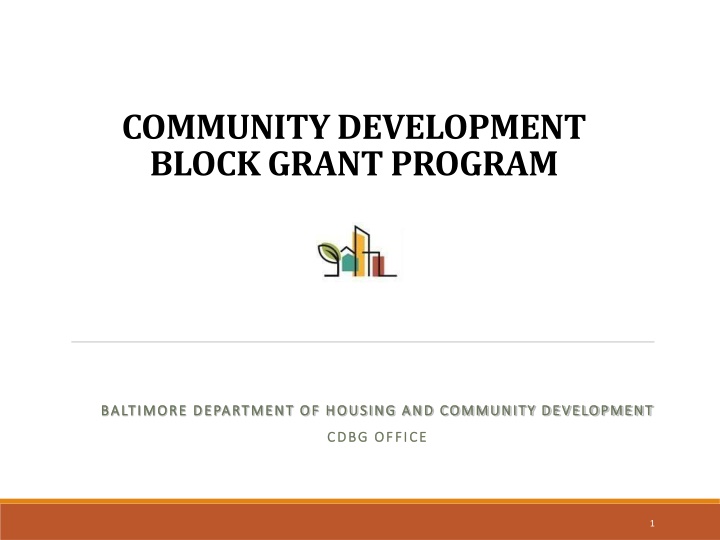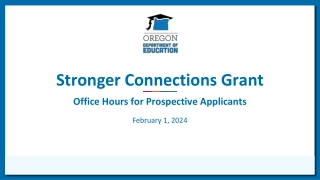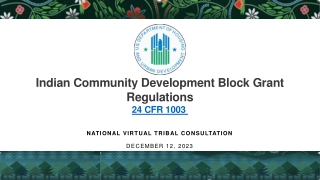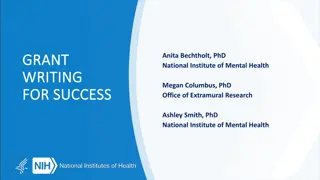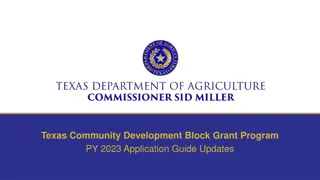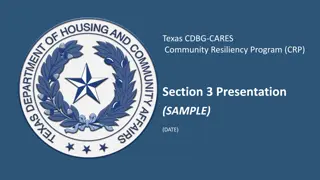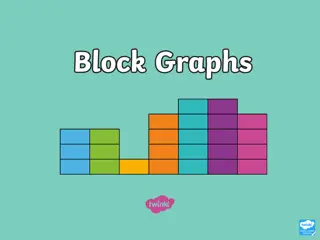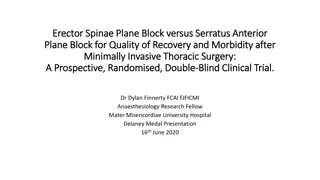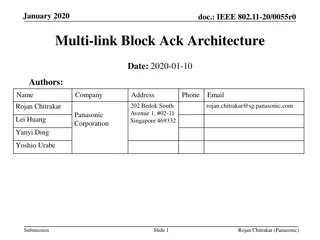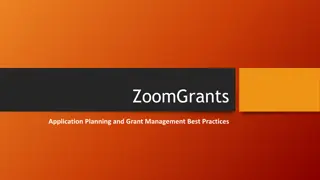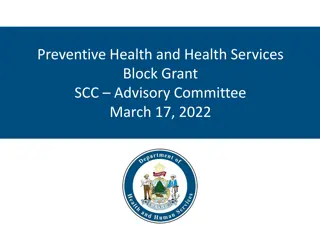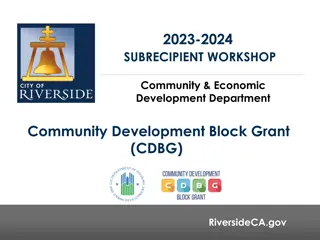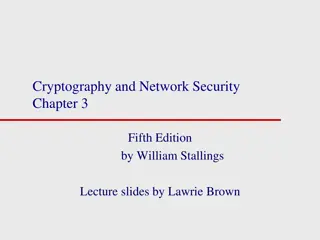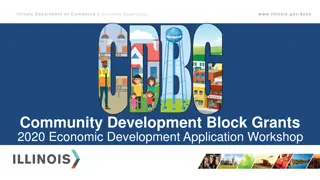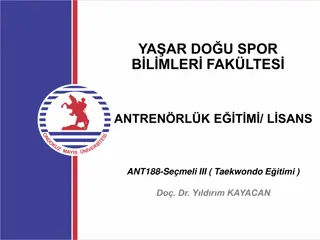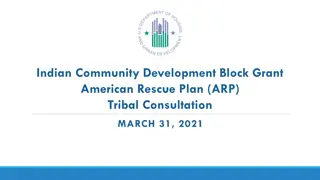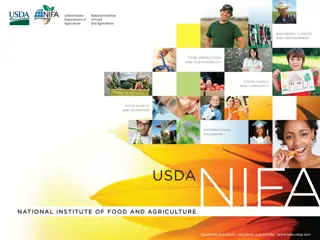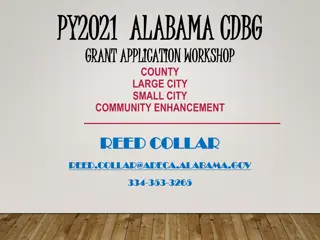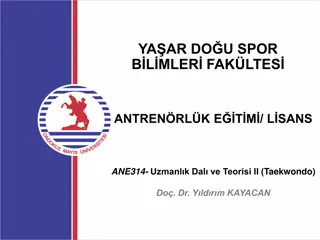Community Development Block Grant Program Overview
The Community Development Block Grant (CDBG) program, administered by the Baltimore Department of Housing and Community Development, aims to improve communities by providing decent housing, a suitable living environment, and expanding economic opportunities. Eligible activities include property acquisition, rehabilitation, construction of public facilities, and more. Ineligible activities consist of fundraising, political activities, and certain government expenses.
Download Presentation

Please find below an Image/Link to download the presentation.
The content on the website is provided AS IS for your information and personal use only. It may not be sold, licensed, or shared on other websites without obtaining consent from the author.If you encounter any issues during the download, it is possible that the publisher has removed the file from their server.
You are allowed to download the files provided on this website for personal or commercial use, subject to the condition that they are used lawfully. All files are the property of their respective owners.
The content on the website is provided AS IS for your information and personal use only. It may not be sold, licensed, or shared on other websites without obtaining consent from the author.
E N D
Presentation Transcript
COMMUNITY DEVELOPMENT BLOCK GRANT PROGRAM BALTIMORE DEPARTMENT OF HOUSING AND COMMUNITY DEVELOPMENT BALTIMORE DEPARTMENT OF HOUSING AND COMMUNITY DEVELOPMENT CDBG OFFICE CDBG OFFICE 1
THE CDBG PROGRAM General Overview CDBG is a Federally funded program, designed to assist local jurisdictions implement community development initiatives that address the core goals of Title I of the Housing and Community Development Act of 1974, as amended. These goals are to develop viable communities by providing: Decent housing; A suitable living environment; and Expanding economic opportunities Baltimore Department of Housing and Community Development 2
CDBG NATIONAL OBJECTIVES General Overview (contd.) In order to qualify for CDBG funding, each activity must be eligible and address one of the following national objectives as established by the Act: Providing benefit to low- and moderate-income persons; or Aiding in the prevention or elimination of slums and blight; or Addressing an Urgent Need (earthquakes, floods, severe hurricanes, pandemic, governmental declared emergency or disaster) Baltimore Department of Housing and Community Development 3
ELIGIBLE ACTIVITIES Activities that are eligible for CDBG funding include, but are not limited to: Acquisition of real property Relocation and demolition Rehabilitation of residential and non-residential structures Construction of public facilities and improvements, such as water and sewer facilities, streets, neighborhood centers, and the conversion of school buildings for eligible purposes Public services, within certain limits Activities relating to energy conservation and renewable energy resources Provision of assistance to profit-motivated businesses to carry out economic development and job creation/retention activities Baltimore Department of Housing and Community Development 4
INELIGIBLE ACTIVITIES Ineligible activities include, but are not limited to: Fundraising Political activities Expenses required to carry out the regular responsibilities of local government Income payments Construction/Rehabilitation of buildings or portions thereof, used for general conduct of government Purchase of equipment, fixtures, motor vehicles, furnishings or other personal property Baltimore Department of Housing and Community Development 5
UNALLOWABLE COSTS Costs that are unallowable under the CDBG Program include, but are not limited to: Bad Debts Contingencies Contributions Donations Entertainment Costs Gifts and awards Fines and Penalties Interest Fundraising Litigation Expenses Losses on other awards Baltimore Department of Housing and Community Development 6
LIMITS ON THE USE OF FUNDS Attention should be paid to the following limits on the use of CDBG funds: Separate applications must be completed for operating support and capital projects. CDBG funds cannot be used to acquire property that will be used primarily for religious purposes or to promote religious interests. For capital projects, religious organizations and their affiliates may use CDBG funds for minor repairs to a facility that is used to house eligible public services. Funding requests to acquire property for an eligible use must identify site, sales price and estimated value based on comparable market values. Capital cost must be supported by cost estimates. If funds are awarded for construction projects, a small percentage of the grant will be retained for City inspection and monitoring costs. Baltimore Department of Housing and Community Development 7
HUD OUTCOME-BASED PERFORMANCE MEASUREMENT HUD has established an Outcome-Based Performance Measurement System to address the Objectives and Outcomes of the CDBG program. The Objectives are: CREATING A SUITABLE LIVING ENVIRONMENT relates to activities that provide benefit to communities, families or individuals by addressing issues in their living environment such as poor infrastructure, crime, literacy, etc. PROVIDING DECENT HOUSING relates to any housing activity designed to meet the housing needs of individuals and families. CREATING ECONOMIC OPPORTUNITIES applies to activities related to economic development, commercial revitalization or job creation. Baltimore Department of Housing and Community Development 8
HUD OUTCOME-BASED PERFORMANCE MEASUREMENT (contd.) The Outcomes are: AVAILABILITY/ACCESSIBILITY - applies to activities that make services, infrastructure, public services, housing or shelter available or accessible to low- and moderate-income people, including persons with disabilities. AFFORDABILITY - applies to activities that provide affordability in a variety of ways to low- and moderate-income persons such as affordable housing or services such as transportation or employment training. SUSTAINABILITY: PROMOTING LIVABLE AND VIABLE COMMUNITIES applies to activities that are aimed at improving communities of neighborhoods helping to make them livable or viable by providing benefit to low- and moderate-income persons, or by eliminating slums or blighted areas or by providing services that sustain communities. Baltimore Department of Housing and Community Development 9
MAYORAL PRIORITIES Each program or project to be funded under the CDBG Program must be designed to address one or more of the Federally-mandated Outcome-Based Performance Measures listed above. Applicants should also indicate how their programs or activities would meet a Mayoral Priority and one of the objectives outlined in the City of Baltimore 5-year Consolidated Plan (2020-2024). Mayoral Priorities that are consistent with CDBG objectives include: BUILDING PUBLIC SAFETY - develop a holistic public safety strategy PRIORITIZING YOUTH - invest in the promise of young Baltimoreans CLEAN Baltimoreans, improve life outcomes for residents, clean up neighborhoods, and focus on collaboration AND HEALTHY NEIGHBORHOODS - Uplift quality of life for Baltimore Department of Housing and Community Development 10
MAYORAL PRIORITIES (contd.) EQUITABLE NEIGHBORHOOD DEVELOPMENT - Support the businesses and workers most impacted by COVID-19, retain legacy residents, support capital investment in formerly redlined neighborhoods, prioritize local, women-owned and Black-owned businesses, and close the digital divide. RESPONSIBLE STEWARDSHIP OF CITY RESOURCES - Modernize outdated City processes, improve access and affordability of services, recruit and retain a strong workforce, and be transparent and accountable about the government s performance. Baltimore Department of Housing and Community Development 11
CDBG OBJECTIVES OUTLINED IN THE 5- YEAR PLAN Baltimore s CDBG objectives are: Focus on Impact investment Areas: Build on and leverage existing assets, Stabilize homeownership markets, Support neighborhood-serving businesses Maintain and improve neighborhood institutions Southwest Impact Investment Area West Impact Investment Area East Impact Investment Area Park Heights Impact Investment Area Impact Investment Areas map Baltimore Department of Housing and Community Development 12
CDBG OBJECTIVES OUTLINED IN THE 5- YEAR PLAN Affordable Housing Preserve and maintain existing affordable housing Create and increase affordable rental housing Support housing for Special Needs Populations Support rehabilitation of primarily vacant/abandoned structures for homeownership Support construction of new homeownership units Strengthen Homeownership markets Provide incentives to increase homeownership and maintain strong homeowner- based markets, including neighborhoods that are affordable to working class home buyers Healthy Homes/Homeowner Maintenance Assistance Assist homeowners in maintaining their homes Support lead abatement programs Support Code enforcement, blight elimination and strategic stabilization Baltimore Department of Housing and Community Development 13
CDBG OBJECTIVES OUTLINED IN THE 5- YEAR PLAN Strategic Neighborhood Investment Support Social, Economic, and Community Development Services Invest in Public Facilities & Public Open Space Improvements Conduct Blight Elimination & Stabilization actions Workforce Development and Poverty Abatement Support adult education, literacy programs, employment training and access to job networks Support housing counseling, tenant legal services and Fair Housing enforcement Support youth job training and internship programs Emergency assistance, substance abuse referrals, crisis intervention, Invest in economic opportunities for startup businesses, technical assistance to existing and/or new businesses, recruiting new businesses to neighborhood commercial areas, Support safety patrols and neighborhood watch groups, legal assistance to neighborhood organizations regarding nuisance abatement, illegal dumping and elimination of blighting properties Baltimore Department of Housing and Community Development 14
CDBG OBJECTIVES contd. Housing and Services to Special Needs Populations Support development of rental and home buyer units with built-in accessibility features. Assist homeowners in maintaining and modifying their homes for accessibility Support services including but are not limited to health care, hospice care, economic development programs that create job opportunities for people living with special needs, and safe transportation among sites regularly used by homeless people in Baltimore City, Support resource and drop-in centers that provide meals to persons with special needs and HIV/AIDS, case management and psycho-social services, access and referrals to medical and mental health care, substance abuse treatment and relapse prevention, economic benefit programs, education, subsistence payments, and vocational or employment programs. Baltimore Department of Housing and Community Development 15
CDBG OBJECTIVES contd. Preventive & Emergency Services to the Homeless Support services targeted to homeless persons, families, youth, and veterans, including, but not limited to, housing in overnight shelters, transitional housing facilities, operations of day resource centers, health care centers, convalescent care services, employment programs, eviction prevention assistance, and outreach services. Preventative and emergency services to homeless youth and youth at risk of homelessness Baltimore Department of Housing and Community Development 16
TIMELINE FOR CD-48 Notification of 1st public hearing regarding Needs/Performance and Request For Proposal (RFP s) under the CDBG program for Federal Program Year 2022/City Fiscal Year 2023 December 8, 2021 December 16, 2021 Needs/Performance Public Hearing January 19, 2022, 5:00 p.m. Deadline for submission of proposals and written comments on the Needs/Performance Public Hearing January 2022 - April 2022 Review & finalize all proposals and prepare the Draft Annual Action Plan for public review and comments April/May 2022 Public Hearing on Draft Annual Action Plan Baltimore Department of Housing and Community Development 17
TIMELINES FOR CD-48 (contd.) Spring 2022 Deadline for written comments on Draft Annual Action Plan Review of all public comments & finalize Annual Action Plan Plan submitted to City s Board of Estimates for approval Spring 2022 Submit Annual Action Plan to HUD Summer 2022 Anticipated HUD approval of Annual Action Plan July 1, 2022 Program Year begins All applications for CFY 2023 must be submitted electronically via the Neighborly platform at: https://portal.neighborlysoftware.com/BALTIMOREMD/Participant Baltimore Department of Housing and Community Development 18
GUIDELINES FOR SUBMISSION 1. Separate proposals must be submitted for operating costs and capital projects. 2. Name your Neighborly case with your organization name. Please do not call it CDBGapplication or use your personal name. 3. CDBG funds are limited. Match/leveraging information is required. A tab is available in the Excel Budget spreadsheet and applicants with more than one CDBG funded activity should complete the Leveraging tab for each activity. The leveraging information is important in the review process as it demonstrates community support for the proposed program/project and prevents over- reliance on CDBG funds. 4. A tab of the HUD Matrix Codes is available at the end of the budget spreadsheet. Applicants should refer to it to determine the correct activity for the work they propose. 5. CDBG funding will likely be at or below levels of previous years. Continued funding is not guaranteed. Public service activities are unlikely to be increased and may be reduced due to the federally mandated cap. Baltimore Department of Housing and Community Development 19
For assistance or guidance, please call (410) 396-3507 or email Lorraine.Cannon@baltimorecity.gov Baltimore Department of Housing and Community Development 20
